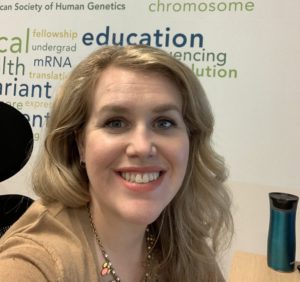Posted By: Sarah Robbins, PhD, 2019-2020 ASHG/NHGRI Genetics Education & Engagement Fellow

I joined ASHG as a member in 2015. I attended the ASHG Annual Meeting in Baltimore that year, where I saw information about the Public Policy and Education fellowships. While I was still early in my PhD studies, finding out about the fellowships made me think about careers outside the traditional academic track for PhD students. I still wanted to be a part of the genetics community, but I wasn’t sure where I would fit.
As I was finishing my PhD thesis, I realized that what I liked the most about studying genetics was finding out more about scientific advances and thinking about how they could be useful for society. I loved talking with other students, my family, and friends about the impact of genetics on healthcare, identity, and future generations.
When I heard more about the fellowship, I knew it would be a great opportunity to learn about the field of science outreach and to explore multiple career paths, including federal government and non-profit work. Though PhD scientists learn many transferrable skills at the bench, a fellowship like this one helps to demonstrate those skills in a more traditional environment.
When preparing your application, make sure to highlight the experiences that inspired you to pursue this career. For me, it was working with 23andMe’s Education team on their DNA Decoder magazine for undergraduate students and teaching classes for high school, graduate, and medical students during my PhD work at Johns Hopkins.
So far, I’ve spent five months at the National Human Genome Research Institute (NHGRI) in the Education and Community Involvement Branch, with Carla Easter, PhD, and her team. I mainly worked on a project to evaluate and publicize the Short Course in Genomics. The Course is a bidirectional learning workshop for teachers to help them develop new material from direct interaction with scientists.
I also talked to NHGRI scientists across many research areas about the exciting challenge of conveying cutting-edge content to teachers. I also contributed to social media content for teachers and the public through NHGRI’s channels and to planning for other engagement activities. I had such a fun experience interacting with lots of visiting students coming to learn about science at the NIH.

Next, I was able to fit in a six-week mini-rotation at a government contractor, Ripple Effect Communications, Inc. I was interested in learning more about science policy and communication, but especially about how those fields can work together to inform public knowledge of science. I worked with Jessica Escobedo and the Science Policy team to build a community of scientific consultants and learned new techniques for commercial communications.
And now, I just started my rotation at the ASHG headquarters in Rockville, MD. I look forward to bringing the outreach, evaluation, and communications skills I learned during my other rotations to my work here at ASHG!
The deadline to apply for the ASHG/NHGRI Genetics Education & Engagement Fellowship has been extended to April 17. This fellowship supports early-career genetics professionals wishing to transition to careers in genetics education and public engagement.
